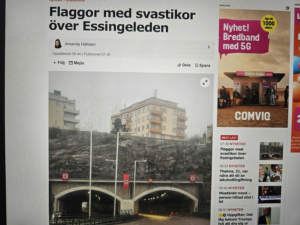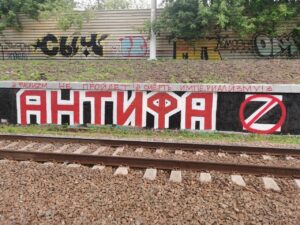The tactics and maneuvers in the past months have been motivated both by the new and, in part, historical strength and the respective representation of parties, groups, and interests in the European Parliament.
The group European Conservatives and Reformists (ECR)
In its old composition, the ECR group would have reached a little more than 70 mandates (MEPs). Following the elections, they have already welcomed new partners: the Croatian Domovinski Pokret (DP, Homeland Movement), the Cypriot Ethniko Laiko Metopo (ELAM, National Popular Front), Danmarksdemokraterne (DD, Denmark Democrats), the Alianța pentru Unirea Românilor (AUR, Alliance for the Union of Romanians), the four French ex-Reconquête deputies, and others. This way, the ECR now consists of 83 MEPs, making it the third-largest group, led by the Italian Fratelli d’Italia. The most considerable uncertainty at the moment is the Polish Prawo i Sprawiedliwość, who have been unhappy with internal post-appointment politics.
The group Identity and Democracy (ID)
Since the ID group recently excluded the German Alternative für Deutschland (AfD), the ID would now only convene 55 MEPs if the pre-election composition remains. If we count the Portuguese Chega, which has been a member of the ID party alliance for quite some time, the group reaches 57 MEPs. Until now, no other parties have been seriously considered or shown interest. There have been speculations about whether AfD could return to the ID after it suspended its Spitzenkandidat Maximilian Krah from its delegation just one day after the elections and long before the constitution of the new parliament. Despite the insistence of long-term partner Freiheitliche Partei Österreichs (FPÖ), the Rassemblement National (RN) remained firm in its position against the AfD. This stance has become even more pronounced since their campaigning in France intensified following the European elections, which resulted in snap elections being declared in France. Although RN won the first round, the final result of the snap elections and their impact on European Parliamentary dynamics remains to be seen.
The shattered dreams of a united ECR-ID group
Once in a while, ideas of a broad coalition encompassing ECR and ID members have been aired. The most concrete milestone was probably the “Declaration for the Future of Europe,” dating from July 2021 and signed by most ID and relevant ECR members. Apart from several high-ranking meetings, especially between the RN, PiS, and Fidesz, there were no further attempts to elaborate substantial cooperation. Nonetheless, with the elections approaching, speculations rose, particularly regarding the possible collaboration between Fratelli d’Italia (FdI) and the RN. However, on the eve of the elections, the perceived pragmatism of Italian Prime Minister and FdI leader Giorgia Meloni towards European Commission politics seemed to be the final nail in the coffin for these dreams of a supergroup.
A third group at the far-right fringes?
At the end of June, some parties took action to form a third far-right group, collecting all the splinter mini-delegations. It’s unclear if this was merely a diversion or if there was more substance to it. Initially, the Bulgarian Vazrazhdane and the German AfD communicated their willingness to bring together a group of potential partners. However, the AfD raised doubts about the integrity of some of these parties.
A new group to outpace them all?
Finally, on June 30th, Herbert Kickl (FPÖ), Andrej Babiš (Akce Nespokojených Občanů, ANO), and Victor Orbán (Fidesz), all leaders of their respective parties, held a press conference in Vienna announcing a new alliance: the “Patriots for Europe.”
The new alliance is rooted in a joint declaration of well-known national sovereignist, anti-EU, and pro-European identitarian traditionalist content. They proclaimed their intention to form the largest right-wing group in the European Parliament. So far, they have yet to provide any concrete hints about which other parties they would start talks with. If interest shown by the Italian Lega becomes a reality, it would instantly lead to the collapse of the ID group, as it will fail to reach the required quorum of representation of at least seven countries of origin. This situation also encourages others to leave the sinking ship and join the rising star. However, not everything aligns in favor of the alliance. There have been speculations that the Slovakian social-democratic party SMER could participate, and the ANO just left the liberal party group. Both have made significant shifts to the right but are still significantly misaligned with the RN, the PVV, or the VB.
As a wrong turn can lead to a party being ousted and left unattached to a parliamentary group, it is likely that the maneuvers will continue until the last moment.
However, there is no such thing as a last moment. Parliamentary groups can be formed throughout the whole legislature, provided they meet the quora. What is happening right now is bickering for the starting positions. Yet, this hectic tactical maneuvering will likely continue to cast a shadow over the upcoming legislature’s political process, from short-term ballot coalitions to formal regroupings.
EU Electoral Results
Following are the results of far-right parties across Europe that gained at least one European mandate. Noted are their vote share, number of mandates, and the party’s position in their national ranking.
- Rassemblement National (F): 31,4%, 30 MEPs, 1
- Reconquete (F): 5,5%, 5 MEPs, 6
- Vlaams Belang (B): 14,5% 3 MEPs, 2
- Fratelli d’Italia (I): 28,8%, 24 MEPs, 1 Forza Italia (I): 9,6%, 8 MEPs, 3
- Lega (I): 9%, 8 MEPs, 4
- Vox (E): 9,6%, 6 MEPs, 3
- Se Acabó la Fiesta (E): 4,6%, 3 MEPs, 4
- Freiheitliche Partei Österreichs (A): 25,4%, 6 MEPs, 1
- Sverigedemokraterna (SE): 13,2% 3 MEPs, 4
- Danskdemokraterne (DK): 7,4%, 1 MEP, 4
- Dansk Folkeparti (DK): 6,4%, 1 MEP, 7
- Nacionālā apvienība (LAT): 22,1%, 2 MEPs, 2
- Hnutie Republika (SK): 12,5%, 2 MEPs, 3
- Fidesz (HU): 44,9%, 10 MEPs, 1
- Mi Hazánk Mozgalom (HU): 6,4%, 1 MEP, 4
- Alternative für Deutschland (AfD): 15,9%, 15 MEPs, 2
- Alianța pentru Unirea Românilor (RO): 14,9%, 5 MEPs, 3
- SOS Romania (RO): 5%, 2 MEPs, 6
- Elliniki Lysi (GR): 9,3%, 2 MEPs, 4
- Dimokratikó Patriotikó Kínima (GR): 4,4%, 1 MEP, 6
- Ethniko Laiko Metopo (ELAM): 11,2%, 1 MEP, 4
- Partij voor de Vrijheid (NL): 17,7%, 6 MEPs, 2 (actually 1)
- Vazrazhdane (BG): 14%, 3 MEPs, 3
- Prawo i Sprawiedliwość (PL): 36,2%, 20 MEPs, 2
- Konfedereracja (PL): 12,1%, 6 MEPs, 3
- Perussuomalaiset (FI): 7,6%, 1 MEP, 6
- Eesti Konservatiivne Rahvaerakond (EST): 14,9%, 1 MEP, 4
- Chega (P): 9,8%, 2 MEPs, 3
- Svoboda a přímá demokracie (CZ): 5,7%, 1 MEP, 7
- Domovinski pokret (CRO): 8,8%, 1 MEP, 3








